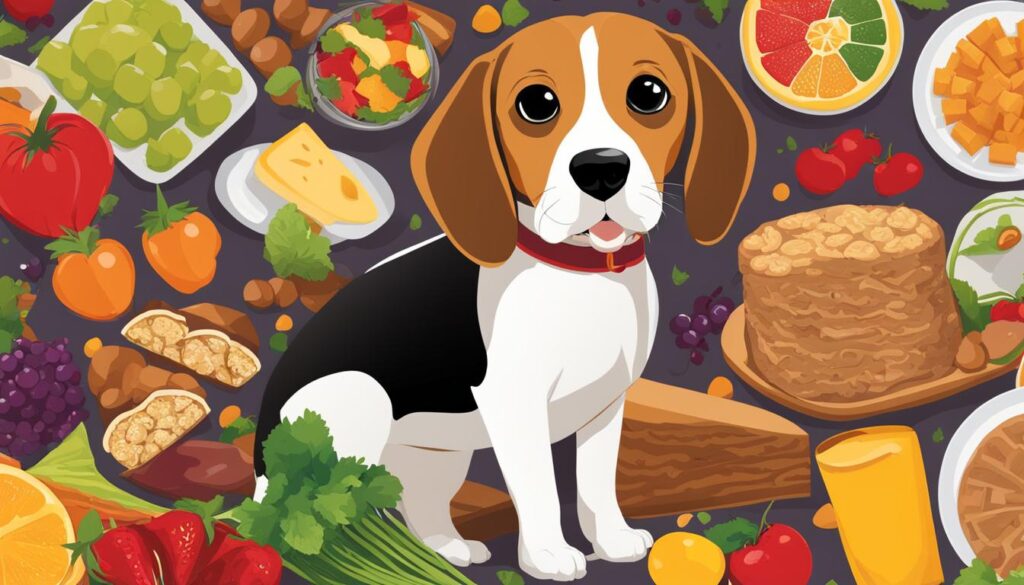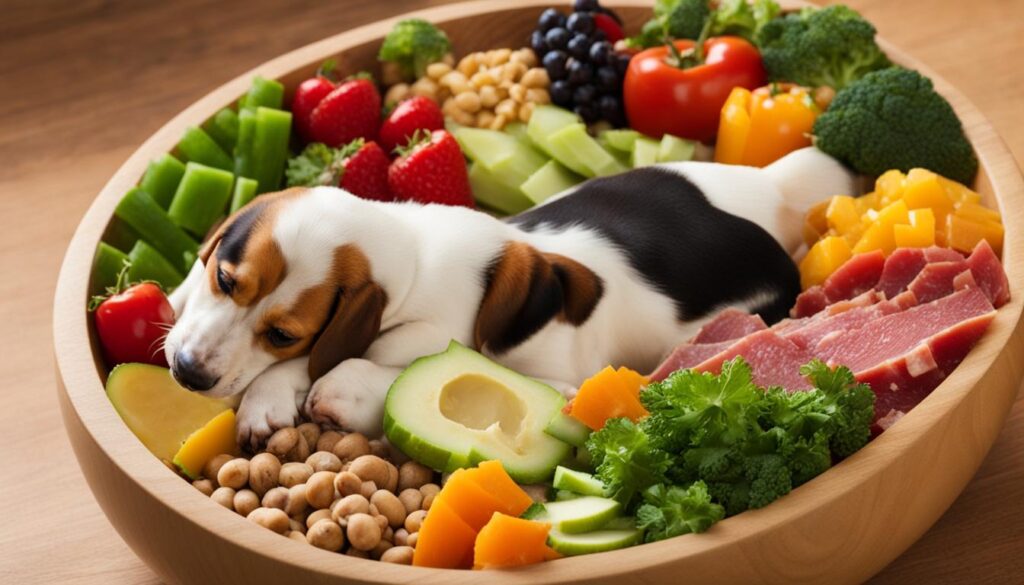As a beloved Beagle owner, you’re likely to be constantly pondering over what to feed your Beagle. Understanding their unique nutritional needs is pivotal to fostering a healthy and joyful pet. Dive into this Beagle feeding guide and unlock the mystery behind a nutritious Beagle meal plan. Our handpicked Beagle food recommendations are tailored to ensure your furry friend not only survives but thrives. Discover the optimal path to keep your Beagle’s tail wagging with satisfaction.
Key Takeaways
- Identify the fundamental components of a balanced Beagle diet.
- Incorporate Beagle food recommendations for optimal health.
- Create a well-rounded Beagle meal plan that caters to your pet’s needs.
- Learn what to feed your Beagle to maintain their energy and well-being.
- Gain insights into avoiding common feeding mistakes with Beagles.
- Recognize the importance of portion control in a Beagle’s diet.
Understanding Beagle Dietary Needs
Embarking on the journey to perfecting your beloved Beagle’s nutrition requires getting acquainted with their specific dietary requirements. The right balance of nutrients not only supports their energetic disposition but also underpins their overall health. Let’s delve into the details of a Beagle diet that will keep your furry friend’s tail wagging with vitality.
Essential Nutrients for Beagle Health
Like any canine, Beagles thrive on a diet rich in protein, fats, and carbohydrates, along with a suitable mix of vitamins and minerals. Protein is paramount for muscle growth and repair, while fats are an excellent energy source and aid in the absorption of essential soluble vitamins. Carbohydrates provide your Beagle the stamina they need for their active lifestyle, and fiber is essential for digestive health. Pay close attention to incorporating omega fatty acids, which can promote a glossy coat and healthy skin.
Caloric Intake: How Much Should Your Beagle Eat?
Caloric needs for your Beagle may vary based on age, activity level, and metabolism. Puppies, generally more active, require more calories than senior dogs. A healthy adult Beagle typically needs about 45 calories per pound of body weight per day, but this is just a guideline. Monitoring your dog’s physique and energy levels will help you fine-tune the portions to maintain optimal weight.
Common Dietary Restrictions and Allergies in Beagles
Be mindful that Beagles are susceptible to food allergies, which can manifest in skin conditions and digestive upset. Common allergens include soy, wheat, and certain proteins like beef or chicken. It’s crucial to identify and eliminate these from your Beagle’s diet to prevent discomfort and potential health issues. A Beagle-friendly diet might necessitate a shift to hypoallergenic or limited ingredient formulas to keep your dog both happy and healthy.


When considering the best food for Beagles, always opt for high-quality brands known for their wholesome ingredients and nutritional completeness. Some experimentation might be necessary to find the precise formula that suits your dog’s taste and meets their dietary needs, but the reward is a content, healthy Beagle ready to accompany you on life’s adventures.
What Do Beagles Eat: Best Food Options for Your Pet
Discovering the ideal Beagle food encapsulates a journey through various diets and nutritional options. Whether you’re contemplating a Beagle-friendly diet of homemade meals or evaluating the numerous commercial brands, understanding your Beagle’s dietary needs will ensure you can provide them both with sustenance and pleasure.
Homemade vs. Commercial Beagle Foods
The debate between homemade and commercial Beagle foods is one anchored in the balance between nutritional value and convenience. Homemade meals grant you full control over the ingredients, ensuring your Beagle’s diet is free of preservatives and tailored to any specific health requirements. However, the convenience of commercially-formulated diets, which are scientifically crafted to meet your Beagle’s dietary needs, can be a significant time-saver.
Safe Human Foods: What Can Beagles Eat from Your Plate?


Integrating safe human foods for Beagles into your pet’s diet can add variety and nutritional value when done correctly. Foods such as cooked chicken, salmon, and vegetables like carrots or green beans can be shared in moderation. It’s essential, however, to avoid toxic foods like chocolate, grapes, and onions.
The Importance of a Balanced Diet for Your Beagle
A balanced diet is crucial for your Beagle’s overall health and vitality. Striking the right ratio of proteins, fats, and carbohydrates along with essential vitamins and minerals should be the cornerstone of your Beagle-friendly diet planning. Consulting with a veterinarian can assist you in formulating a meal plan that supports your pet’s lifestyle, be they a couch companion or an energetic explorer.
Beagle-friendly Diet: Treats and Snacks
Treats and snacks play an integral part in training and rewarding your Beagle, but they also need to be healthy. Opt for Beagle treats that are low in calories but high in taste. Consider fruits like apple slices or blueberries as nature’s treats, perfect for an affectionate snack.
Conclusion
Navigating the nuances of a Beagle diet can be as challenging as it is rewarding. Throughout this article, we’ve touched upon essential aspects of What Do Beagles Eat, offering you a detailed Beagle feeding guide to ensure your furry companion thrives. From understanding the rich tapestry of nutrients that contribute to their wellbeing, to navigating the broad spectrum of foods available, you now have a fundamental grasp on crafting the Best food for Beagles.
Your Beagle’s dietary needs should not be a mystery, and with the knowledge you’ve gathered here, it won’t be. Remember to provide them with a varied and balanced menu that caters to their unique needs, taking into account their age, size, and energy levels. Whether you opt for nourishing homemade meals or select high-quality commercial foods—balance, moderation, and nutritional value remain key.
Never cease to expand your insights into Beagle food recommendations. As you adjust and fine-tune your approach, keep an eye out for your Beagle’s physical and behavioral responses to their diet. Making informed adjustments to their meal plan as they grow and change is a vital part of responsible pet ownership. With this comprehensive guide as a starting point, you are now better equipped to provide your Beagle with meals that not only satisfy but also support a healthy, exuberant life.
FAQ
What should a Beagle’s diet consist of to maintain their health?
A Beagle’s diet should include a balance of proteins, carbohydrates, fats, vitamins, and minerals to support their overall health. High-quality commercial dog food or well-planned homemade meals that meet AAFCO (Association of American Feed Control Officials) standards are recommended to ensure your Beagle gets all the essential nutrients.
How can I determine the right amount of food to feed my Beagle?
The right amount of food for your Beagle depends on their age, size, activity level, and health status. Generally, adult Beagles require about one cup of dry dog food per day, divided into two meals. However, it’s best to consult with a veterinarian to tailor the feeding amount to your Beagle’s specific needs.
Are there any human foods that are safe to share with my Beagle?
Yes, there are several human foods that are safe for Beagles to eat in moderation. These include cooked, lean meats without any seasoning, certain fruits like blueberries and sliced apples (without seeds), vegetables like carrots and green beans, and cooked grains like rice and oatmeal. Always avoid toxic foods like chocolate, grapes, onions, and anything containing xylitol.
Can Beagles have dietary restrictions or allergies?
Like humans, Beagles can experience dietary restrictions and allergies. Common signs of food sensitivities include itchy skin, ear infections, and gastrointestinal upset. If you notice these symptoms, consult your vet for proper testing and dietary adjustments which may include switching to hypoallergenic or limited-ingredient diets.
Should I feed my Beagle homemade food or commercial dog food?
Both homemade and commercial dog foods have their advantages. Homemade meals allow for more control over ingredients and can be tailored to your Beagle’s preferences and needs. However, they require time, knowledge, and effort to ensure a balanced diet. Commercial foods are convenient, often nutritionally complete, and formulated by pet nutrition experts. The best choice depends on your lifestyle and your Beagle’s health and nutritional requirements.
Why is it important to maintain a balanced diet for my Beagle?
Maintaining a balanced diet is crucial for your Beagle’s overall health and well-being. It ensures that they receive all the necessary nutrients to support their bodily functions, maintain a healthy weight, and prevent nutrition-related diseases. A balanced diet also contributes to a shiny coat, healthy skin, and sustained energy levels.
Can you suggest some Beagle-friendly treats for my dog?
Absolutely! Beagle-friendly treats include small pieces of cooked chicken or turkey, baby carrots, apple slices (without the seeds), and specialized dog treats that are low in calories and made without fillers or artificial additives. Remember, treats should only make up 10% of your Beagle’s daily caloric intake to prevent overfeeding.

